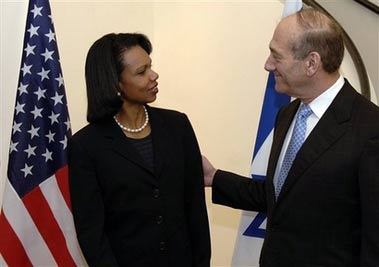Ramallah, West Bank - Palestinian President Mahmoud
Abbas said Wednesday his efforts to reach a power-sharing agreement with the
militant group Hamas have collapsed, raising concerns a deadlock will lead to
more factional fighting after deadly weekend clashes.

In this photo released by the United States
Embassy in Tel Aviv, Israeli Prime Minister Ehud Olmert, right, speaks to
United States Secretary of State Condoleezza Rice, left, prior to their
meeting in Jerusalem, Wednesday, Oct. 4, 2006. [AP
Photo] |
But the Palestinian leader received a boost from US Secretary of State
Condoleezza Rice, who promised the United States would do more to alleviate the
plight of Palestinians.
"I told the president (Abbas) that we are very concerned, of course, about
the humanitarian conditions in the Palestinian territories," she said. "I said
to him that we would redouble our efforts to improve the conditions for the
Palestinian people."
However, she gave few specifics on what steps the US was prepared to take.
Rice is in the region to try to bolster the moderate Abbas and revive peace
efforts. She met with Israeli Prime Minister Ehud Olmert later Wednesday.
A statement from OImert's office after the meeting said Israel will not
release Palestinian prisoners until an Israeli soldier, Cpl. Gilad Shalit, is
freed. Shalit was captured on June 25 by militants linked to Hamas.
Israel kept up its pressure on Palestinian militants in Gaza. Early Thursday
an Israeli aircraft targeted a car in southern Gaza, killing two Islamic Jihad
militants, Palestinian security and hospital officials said. The Israeli
military said the militants were planning a terror attack.
Conditions in the West Bank and Gaza have rapidly deteriorated since Hamas
defeated Abbas' Fatah Party in January elections and Western countries cut off
funds to the Palestinian government.
Despite the sanctions, Hamas has refused to accept international demands that
it renounce violence, recognize Israel and accept previous Israeli-Palestinian
peace agreements.
Abbas, who was elected separately in a presidential vote last year, has been
trying to broaden and moderate the government to make it acceptable to the
international community. But after Hamas and Abbas announced a tentative
coalition deal last month, Abbas said Wednesday that the talks have broken down.
"There is no dialogue now," Abbas said at a news conference with the Bahraini
foreign minister. He said the coalition deal "is over now, and we have to start
from square one."
The negotiations have foundered over Hamas' refusal to recognize Israel, even
implicitly. The tensions spilled over into Hamas-Fatah violence this week, with
10 people killed and more than 100 wounded. The fighting heightened fears of
civil war.
Abbas holds wide-ranging powers that include the authority to disband the
government. But he has sought to avoid confrontation, and he signaled talks with
Hamas could be renewed later.
In Gaza, Prime Minister Ismail Haniyeh of Hamas accused Rice of trying to
"rearrange" the Middle East to suit American and Israeli interests.
Haniyeh said Hamas considers dialogue "the only way" to solve its
disagreements with Abbas and would do everything possible to avoid further
violence. "I don't think turning back on this dialogue can serve the higher
interests of the Palestinian people," he said.
Public Works Minister Abdel Rahman Zaidan of Hamas said a compromise could be
to form a government of technocrats, headed by a prime minister who is not from
Hamas.
"There is serious thinking within Hamas to form a national unity government
which is composed of professionals, basically, not political faces," Zaidan told
The Associated Press. "This government would not be headed by a Hamas leader."
However, it was not clear whether Hamas would agree to have such a government
recognize Israel.
Fatah lawmaker Saeb Erekat said no new government would be able to avoid
recognizing Israel. "What matters is the program of the government," he said.
An Abbas confidant, speaking on condition of anonymity because he was not
authorized to speak to the media, concurred that a government of professionals
could be a way out of the current crisis.
Another person involved in Hamas-Fatah negotiations said the sides were
considering a Qatari initiative to establish a Cabinet with members from various
Palestinian factions, headed by an independent prime minister.
The negotiator, who declined to be identified because the talks are
continuing, said the plan already had been presented to Abbas and Hamas' top
leader, Khaled Mashaal, who lives in exile in Syria. Qatar's foreign minister is
expected in Syria this week to meet with Mashaal.
Rice reiterated at her news conference with Abbas that a Palestinian
government must accept the international conditions. But in the meantime, she
said the U.S. was ready to step up efforts to improve the humanitarian situation
for the Palestinians and bolster Abbas.
The situation is especially dire in Gaza, which has been
hurt by Israeli closures of key border crossings and an Israeli military
offensive launched after Palestinian militants captured an Israeli soldier in
June. The closures have led to shortages of food and prevented Gazans from
traveling to neighboring Egypt.